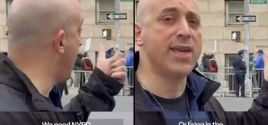Iran Feels Pinch As Major Banks Curtail BusinessBy Robin WrightWashington Post Mar. 27, 2007 |
Popular 
ADL Urged Congress to Pass FISA Law Spying on Americans to 'Protect Israel'

Rep. Thomas Massie Warns Congress is Trying to Pass Hate Speech Laws to Outlaw Criticism of Israel

'Sniper Seen on Roof Overlooking Pro-Palestine Protest' at Indiana University

Mike Johnson Pushes Debunked Lie That Israeli Babies Were 'Cooked in Ovens' On October 7

Claim Jewish Student Was 'Stabbed In The Eye' by Pro-Palestine Protester Draws Mockery After Video Released
 More than 40 major international banks and financial institutions have either cut off or cut back business with the Iranian government or private sector as a result of a quiet campaign launched by the Treasury and State departments last September, according to Treasury and State officials. The financial squeeze has seriously crimped Tehran's ability to finance petroleum industry projects and to pay for imports. It has also limited Iran's use of the international financial system to help fund allies and extremist militias in the Middle East, say U.S. officials and economists who track Iran. The U.S. campaign, developed by Treasury Secretary Henry M. Paulson Jr. and Secretary of State Condoleezza Rice, emerged in part over U.S. frustration with the small incremental steps the U.N. Security Council was willing to take to contain the Islamic republic's nuclear program and support for extremism, U.S. officials say. The council voted Saturday to impose new sanctions on Tehran, including a ban on Iranian arms sales and a freeze on assets of 28 Iranian individuals and institutions. "All the banks we've talked to are reducing significantly their exposure to Iranian business," said Stuart Levey, Treasury's undersecretary for terrorism and financial intelligence. "It's been a universal response. They all recognize the risks -- some because of what we've told them and some on their own. You don't have to be Sherlock Holmes to see the dangers." The new campaign particularly targets financial transactions involving the Iranian Revolutionary Guard Corps, which is now a major economic force beyond its long-standing role in procuring arms and military materiel. Companies tied to the elite unit and its commanders have been awarded government contracts such as airport management and construction of the Tehran subway. The practice has increased since the 2005 election of Iranian President Mahmoud Ahmadinejad, U.S. officials say. The Revolutionary Guard -- of which Ahmadinejad is a former member -- is part of the hard-line leader's constituency. "The Revolutionary Guard's control and influence in the Iranian economy is growing exponentially under the regime of Ahmadinejad," Levey said in a speech in Dubai this month. The campaign differs from formal international sanctions -- and has proved able to win wider backing -- because it targets Iran's behavior rather than seeking to change its government. "This is not an exercise of power," Levey said in the interview. "People go along with you if it's conduct-based rather than a political gesture." Iranian importers are particularly feeling the pinch, with many having to pay for commodities in advance when a year ago they could rely on a revolving line of credit, said Patrick Clawson, a former World Bank official now at the Washington Institute for Near East Policy. The scope of Iran's vulnerability has been a surprise to U.S. officials, he added. The financial institutions cutting back business ties are mainly in Europe and Asia, U.S. officials say. UBS last year said it was cutting off all dealings with Iran. London-based HSBC (which has 5,000 offices in 79 countries) and Standard Chartered (with 1,400 branches in 50 countries) as well as Commerzbank of Germany have indicated they are limiting their exposure to Iranian business, Levey said. The rest have asked the United States not to publicize their names. Ahmadinejad's rhetoric -- from denying the Holocaust to comparing Iran's stock exchange to gambling -- has helped, experts say. "There is very little foreign investment in Iran not because of sanctions, but because of the atmosphere created by Ahmadinejad's crazy statements," said Jahangir Amuzegar, former Iranian finance minister and executive director of the International Monetary Fund. Paulson kicked off the effort to warn major financial institutions and government officials about the long-term costs of doing business with Iran during the annual International Monetary Fund and World Bank meetings in Singapore in September. Paulson, Levey and Treasury Deputy Secretary Robert M. Kimmitt have all held dozens of meetings with banks to explain how Iran is using dummy companies and deceptive practices through banks to finance its non-traditional or illicit business activities, U.S. officials say. Both the Iranian government and the private sector have increasingly tried to persuade financial institutions to keep the name of "Iran" or the originating bank in Iran off transactions so they are not traced to the Islamic republic, U.S. officials say. In a related effort, the Bush administration has warned "relevant companies and countries" about the risks of investing in Iran's oil and gas sector, R. Nicholas Burns, undersecretary of state for political affairs, said in congressional testimony Wednesday. Washington is generally trying to drive home to Tehran that its policies will lead to serious "financial hardship," he said. In December, Iranian oil minister Kazem Vaziri Hamaneh acknowledged that Tehran was having trouble financing petroleum development projects. "Currently, overseas banks and financiers have decreased their cooperation," he told the oil ministry news agency Shana. The Bush administration has taken several other actions in recent months to contain Iran, including deploying two Navy carrier strike groups near the Persian Gulf, arresting operatives of the Revolutionary Guards' al-Quds Force in Iraq and pressing for two U.N. resolutions to punish Iran for not suspending its uranium enrichment program. |



